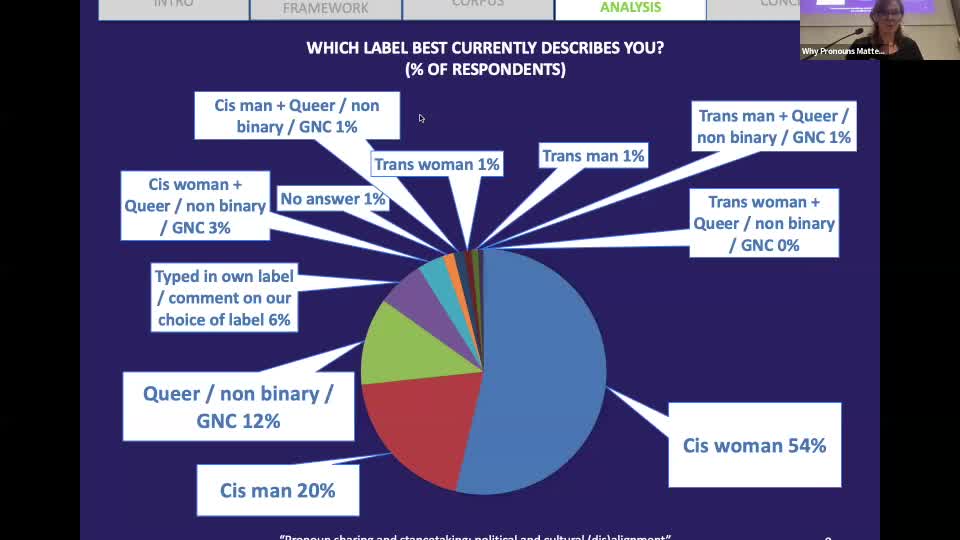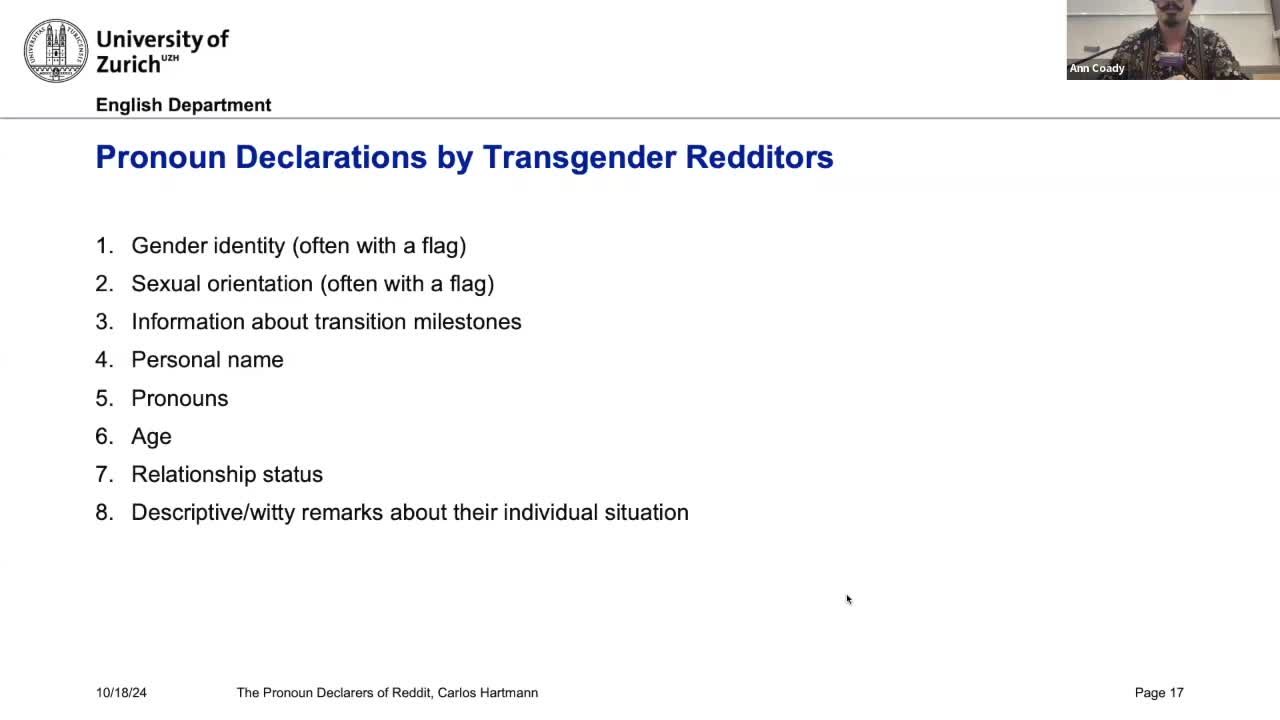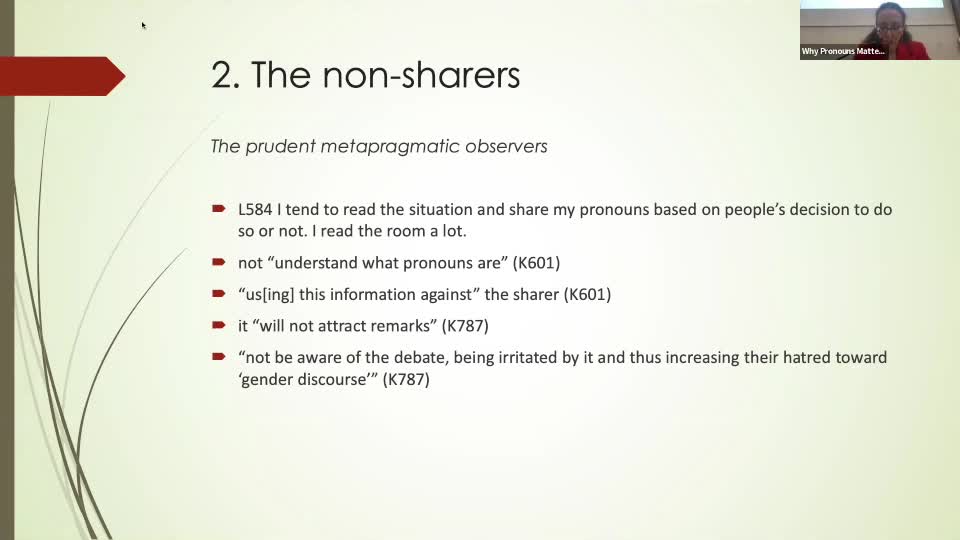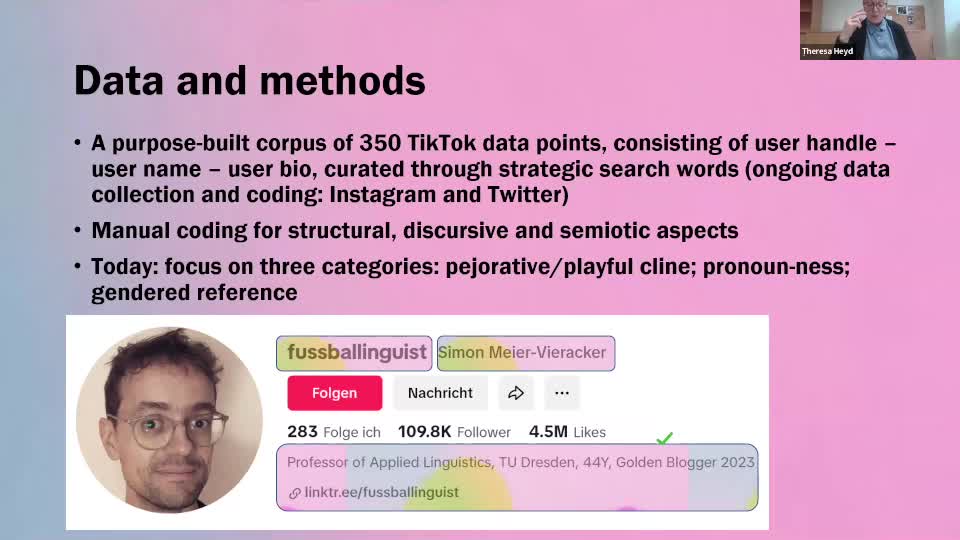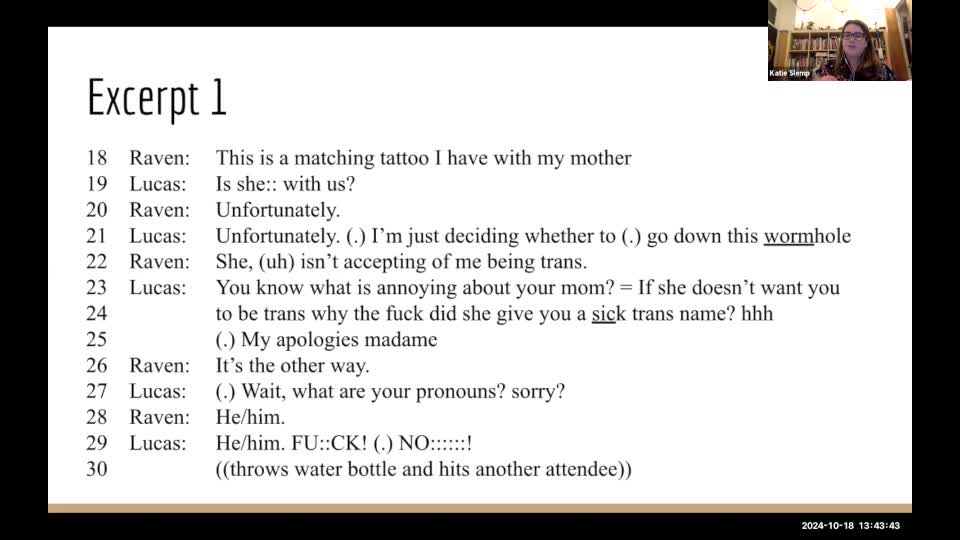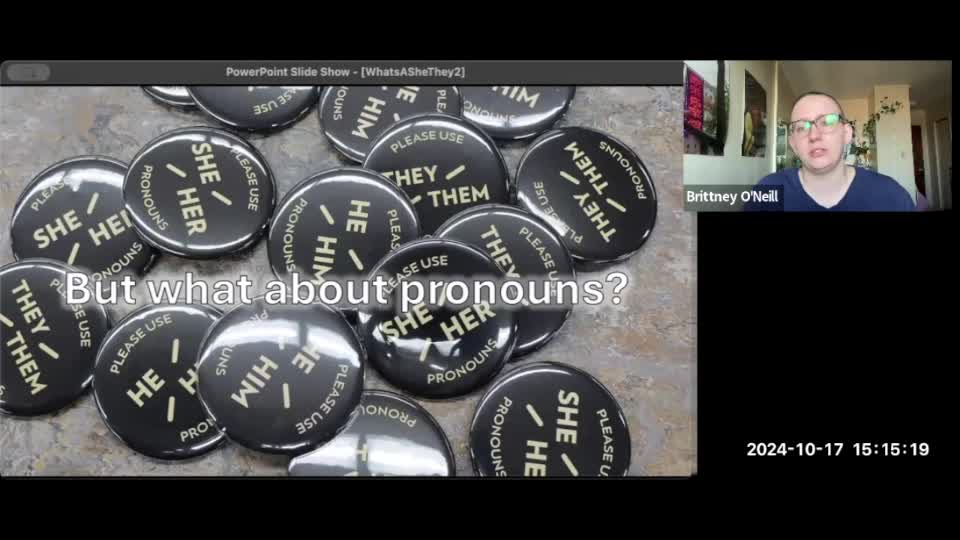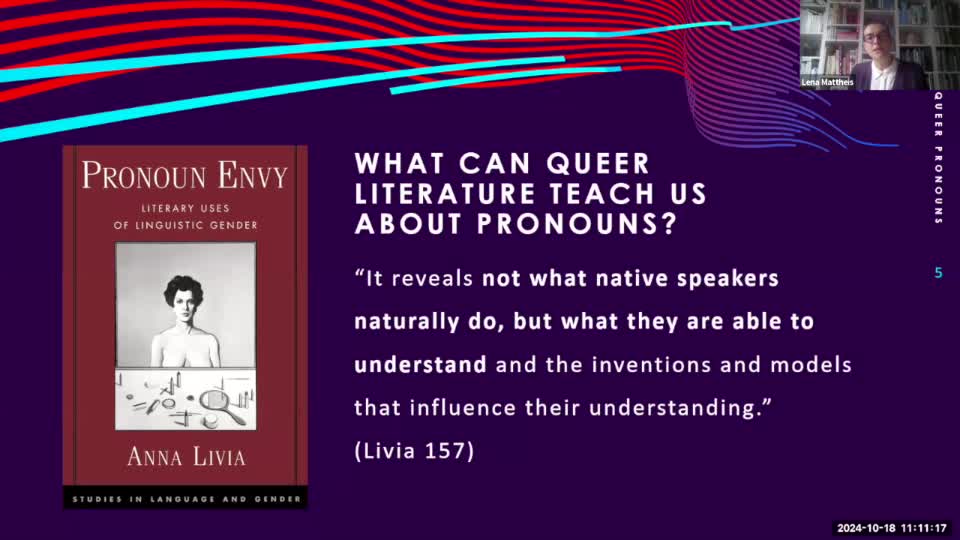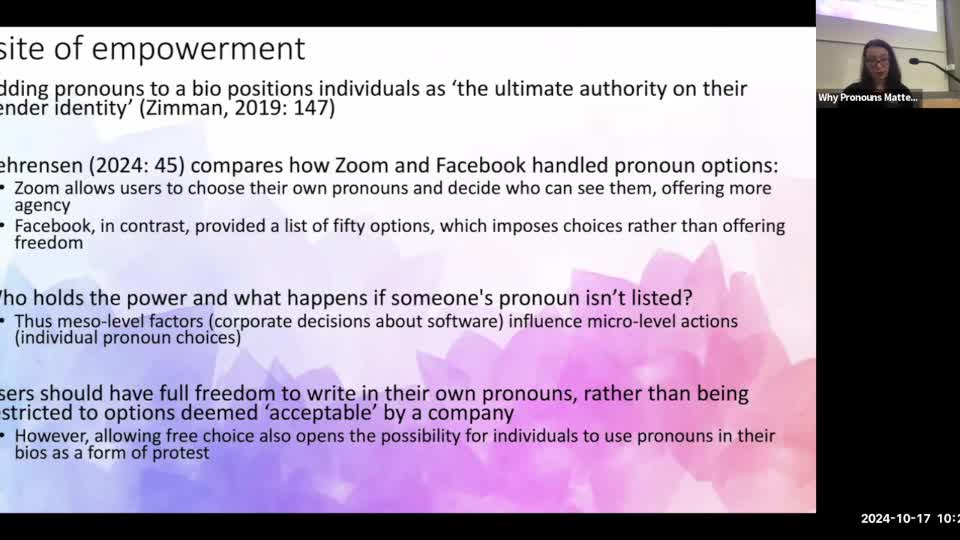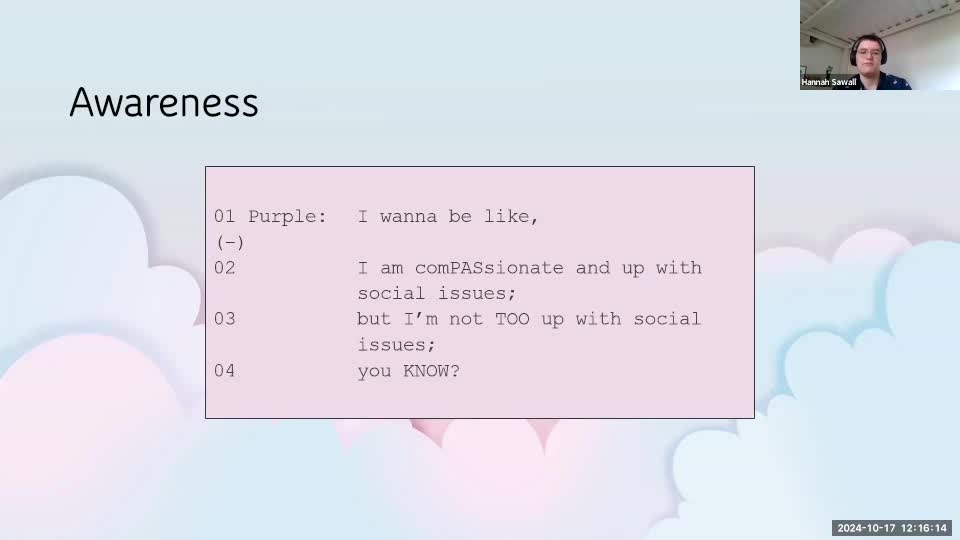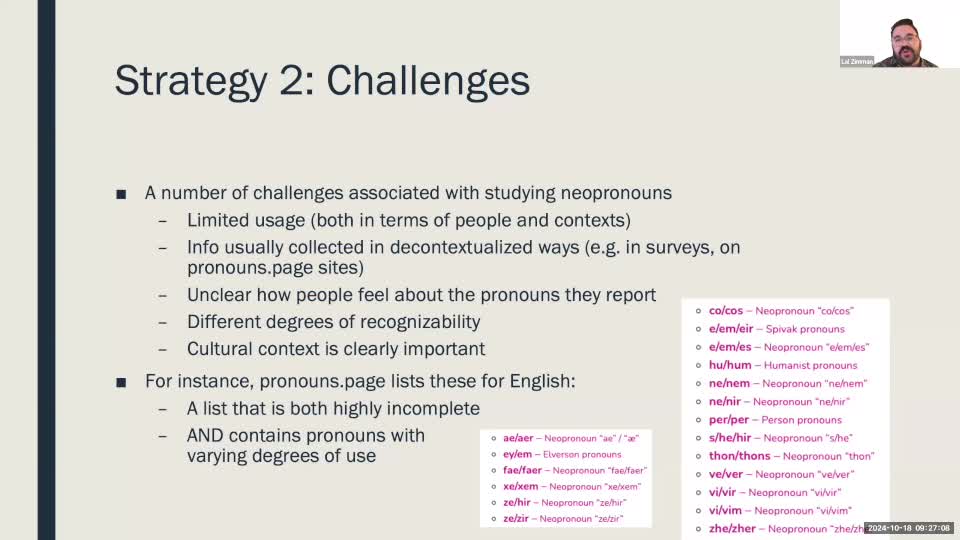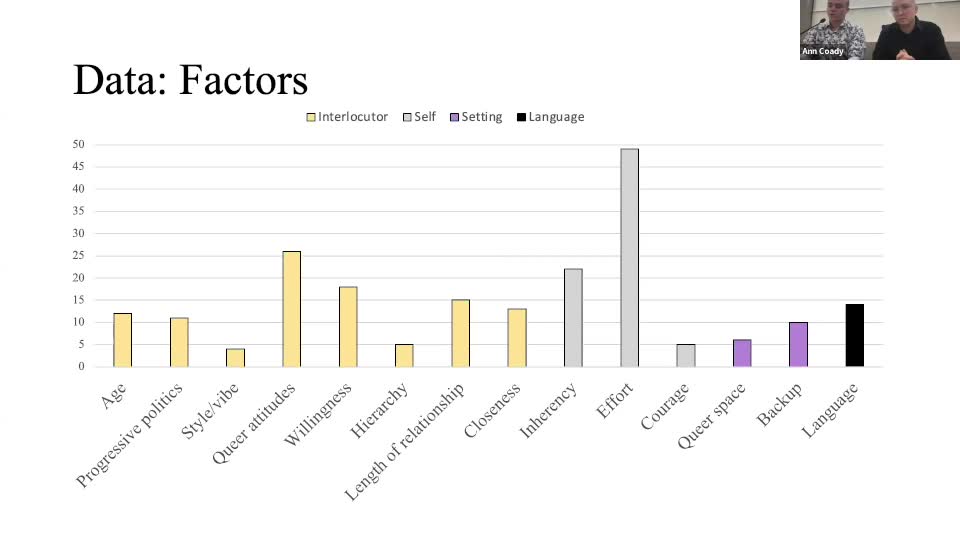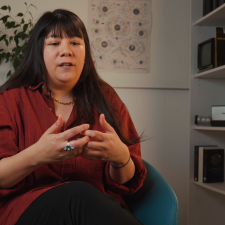Notice
“Epistemology and sharing one’s pronouns: First, second, or third-person knowledge?”, Alexandra Gilbert, Arizona State University, USA
- document 1 document 2 document 3
- niveau 1 niveau 2 niveau 3
Descriptif
In this paper, I consider sharing one’s pronouns as an act that asserts self-knowledge and positions oneself in relation to an addressee and a shared social landscape: see me this way, interact with me thusly. But on what authority and to what ends do we make such assertions? Considering this question, this project forges connections between sociocultural approaches to the English gendered pronoun system (Nevalainen and Raumolin-Brunberg 1994; McConnell-Ginet 2015), stancetaking (Du Bois, 2007; Kiesling, 2009, 2022b), and post-analytic and neopragmatist philosophy of language (Davidson 2001; Rorty 2009; Brandom 2019). This is done primary in service of transfeminist (Enke 2012; Stryker 2006) goals of self-determination and the continued exploration of the specifically linguistic front of this struggle through trans linguistics (Zimman, 2021). I consider the epistemological grounds for this assertion of self-knowledge in relation to a tripartite distinction of first-person knowledge, second-person knowledge, and third-person knowledge, adapted from Davidson (2001). I question whether epistemological authority can be extended to any of these dimensions of knowledge, exploring each in turn.
Sharing one’s pronouns can be understood as an expression of subjective or first-person knowledge, but to what extent is the assertion of one’s pronouns similar to a description of one’s pain after an injury (an example given by Wittgenstein in the Philosophical Investigations, §244, and later referred to by others in relation to the private language argument)? Sharing one’s pronouns relates to second-person knowledge as it is directed to an addressee and communicates certain metapragmatic information about how the addressee should situate the speaker in their mind. These practices can also be understood in relation to third-person knowledge because they require reference to the self as a particular kind of gendered object.
I suggest that these practices be justified not by reference to an essentialist understanding of privileged access to self-knowledge, but rather through an emphasis on intersubjectivity and free and open cooperation with one another. From this perspective, sharing one’s pronouns is less about asserting an essential truth and more about moving through the world in ways less fettered by cisheteronormativity and other harmful discourses.
Thème
Dans la même collection
-
“Pronoun sharing and stancetaking: political and cultural (dis)alignment”, Ann Coady, Université Pa…
I begin my presentation by putting current pronoun-sharing practices in political and theoretical context, briefly discussing the current political debate surrounding these practices and comparing
-
“A sociolinguistic case study on the Pronoun Declarers of Reddit”, Carlos Hartmann, Universität Zür…
For this study, I extracted and analyzed Reddit comments featuring pronoun declarations within their user flairs, the optional descriptors displayed alongside usernames. The goal was to identify a
-
“What’s in a pronoun and how does it matter?: From the perspective of pragmatics”, Sandrine Sorlin,…
SorlinSandrineIn this talk, I wish to give a quick overview of the quite recent ‘pronoun sharing’ trend from a linguistic and pragmatic perspective, going through the new collocations and semantic shifts of the
-
“Mock pronouns”, Theresa Heyd, Universität Heidelberg, Germany
HeydTheresaThis paper gives an account of mock pronouns as a (predominantly digital) discursive practice. The rise of pronouns and pronominal discourse as a gender-inclusive practice has been accompanied by
-
““Wait, what are your pronouns, sorry?”: Conversation analysis of pronoun requests in comedians’ cr…
Comedians on TikTok frequently show videos of their crowd work, where they ask questions to the attendees. While this is not part of their structured stand-up, it allows for spontaneous interaction
-
““What’s a she/they?”: An (auto)ethnographic exploration of epistemic justice and the double bind o…
In this paper, I combine autoethnographic reflections with an exploration of epistemic injustice (e.g. Berenstain, 2016; Davis, 2016; Fricker, 2007; Pohlhaus, 2014) to consider how the persistent
-
“Pronouns, past struggles, new practices: political continuity or radical change?”, Claudine Raynau…
RaynaudClaudineI would like to compare two second wave French feminists’ thought and LGBTQIA+ theorizing and practice regarding pronouns and ponder their possible interactions. My focus will be the work of Luce
-
“Gendernonconforming Pronouns in Literature”, Lena Mattheis, University of Surrey, UK
Queerly reshaped pronouns, forms and narrative strategies are flourishing in contemporary non-binary, trans and queer literature. From singular ‘they’ to ‘it’ to neopronouns to the collective voice of
-
“Pronouns in bio: A site of empowerment, validation, struggle, performance, distraction, and corpor…
Pronouns in bio: A site of empowerment, validation, struggle, performance, distraction, and corporate rainbow washing?
-
““Mein Name ist Lena und meine Pronomen sind she/her”: Exploring Indexicalities of Pronoun Sharing …
Since pronoun sharing has been associated with different political stances from virtue signaling to trans liberation, it is clear that they transport more information than simply how a person asks to
-
"Pronouns, positionality, and power: Institutionalized transphobia, intersectionality and trans-aff…
ZimmanLalThis talk explores the complex role of pronouns in the negotiation of (socio)linguistic justice, leading to the argument that the success of trans-affirming language depends on a broader
-
“Pronouns in Motion: Pronoun variability among Swiss non-binary individuals”, Justyna King and Elij…
Our paper aims to explore pronoun practices and flexibility among Swiss non-binary individuals, by elucidating the factors influencing the pronoun usage of Swiss non-binary people, discerning the
Sur le même thème
-
Entretien avec Ariane Mak autour de son ouvrage En guerre et en grève. Enquêtes dans les cités mini…
MakArianeDe 1939 à 1945, le Royaume-Uni a connu plus de 7 000 grèves, en grande partie dans l’industrie charbonnière.
-
Prendre position dans le trouble / Carnet de passages #2
CourdurièsJérômePitzalisJuliaPeyrautLolaMontécotRobinPayssanAlexiComment s’empare-t-on d’une toute nouvelle thématique ? Comment traiter d’un sujet d’actualité mais surtout polémique ? L’expérience de l’anthropologue Jérôme Courduriès s’est construite au travers
-
“Pronoun sharing and stancetaking: political and cultural (dis)alignment”, Ann Coady, Université Pa…
I begin my presentation by putting current pronoun-sharing practices in political and theoretical context, briefly discussing the current political debate surrounding these practices and comparing
-
“Mock pronouns”, Theresa Heyd, Universität Heidelberg, Germany
HeydTheresaThis paper gives an account of mock pronouns as a (predominantly digital) discursive practice. The rise of pronouns and pronominal discourse as a gender-inclusive practice has been accompanied by
-
“Pronouns in Motion: Pronoun variability among Swiss non-binary individuals”, Justyna King and Elij…
Our paper aims to explore pronoun practices and flexibility among Swiss non-binary individuals, by elucidating the factors influencing the pronoun usage of Swiss non-binary people, discerning the
-
“A sociolinguistic case study on the Pronoun Declarers of Reddit”, Carlos Hartmann, Universität Zür…
For this study, I extracted and analyzed Reddit comments featuring pronoun declarations within their user flairs, the optional descriptors displayed alongside usernames. The goal was to identify a
-
““Mein Name ist Lena und meine Pronomen sind she/her”: Exploring Indexicalities of Pronoun Sharing …
Since pronoun sharing has been associated with different political stances from virtue signaling to trans liberation, it is clear that they transport more information than simply how a person asks to
-
“Pronouns in bio: A site of empowerment, validation, struggle, performance, distraction, and corpor…
Pronouns in bio: A site of empowerment, validation, struggle, performance, distraction, and corporate rainbow washing?
-
"Pronouns, positionality, and power: Institutionalized transphobia, intersectionality and trans-aff…
ZimmanLalThis talk explores the complex role of pronouns in the negotiation of (socio)linguistic justice, leading to the argument that the success of trans-affirming language depends on a broader
-
“Gendernonconforming Pronouns in Literature”, Lena Mattheis, University of Surrey, UK
Queerly reshaped pronouns, forms and narrative strategies are flourishing in contemporary non-binary, trans and queer literature. From singular ‘they’ to ‘it’ to neopronouns to the collective voice of
-
““What’s a she/they?”: An (auto)ethnographic exploration of epistemic justice and the double bind o…
In this paper, I combine autoethnographic reflections with an exploration of epistemic injustice (e.g. Berenstain, 2016; Davis, 2016; Fricker, 2007; Pohlhaus, 2014) to consider how the persistent
-
““Wait, what are your pronouns, sorry?”: Conversation analysis of pronoun requests in comedians’ cr…
Comedians on TikTok frequently show videos of their crowd work, where they ask questions to the attendees. While this is not part of their structured stand-up, it allows for spontaneous interaction


